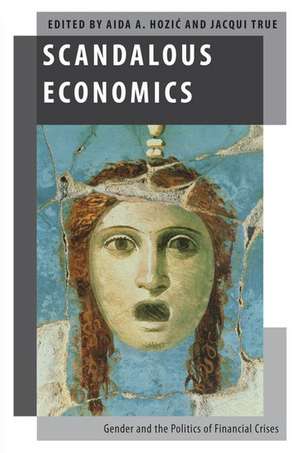Scandalous Economics: Gender and the Politics of Financial Crises: Oxford Studies in Gender and International Relations
Editat de Aida A. Hozić, Jacqui Trueen Limba Engleză Paperback – 21 apr 2016
| Toate formatele și edițiile | Preț | Express |
|---|---|---|
| Paperback (1) | 345.75 lei 10-16 zile | |
| Oxford University Press – 21 apr 2016 | 345.75 lei 10-16 zile | |
| Hardback (1) | 761.32 lei 31-37 zile | |
| Oxford University Press – 21 apr 2016 | 761.32 lei 31-37 zile |
Din seria Oxford Studies in Gender and International Relations
- 27%
 Preț: 370.37 lei
Preț: 370.37 lei - 23%
 Preț: 453.86 lei
Preț: 453.86 lei - 19%
 Preț: 617.59 lei
Preț: 617.59 lei - 14%
 Preț: 199.10 lei
Preț: 199.10 lei - 24%
 Preț: 370.87 lei
Preț: 370.87 lei - 27%
 Preț: 426.14 lei
Preț: 426.14 lei - 7%
 Preț: 216.34 lei
Preț: 216.34 lei - 16%
 Preț: 491.33 lei
Preț: 491.33 lei -
 Preț: 235.79 lei
Preț: 235.79 lei - 19%
 Preț: 127.24 lei
Preț: 127.24 lei - 19%
 Preț: 177.77 lei
Preț: 177.77 lei -
 Preț: 258.50 lei
Preț: 258.50 lei - 10%
 Preț: 439.09 lei
Preț: 439.09 lei - 9%
 Preț: 480.59 lei
Preț: 480.59 lei - 13%
 Preț: 135.12 lei
Preț: 135.12 lei - 27%
 Preț: 402.03 lei
Preț: 402.03 lei - 15%
 Preț: 277.35 lei
Preț: 277.35 lei - 19%
 Preț: 198.22 lei
Preț: 198.22 lei -
 Preț: 287.11 lei
Preț: 287.11 lei - 14%
 Preț: 278.91 lei
Preț: 278.91 lei -
 Preț: 265.32 lei
Preț: 265.32 lei - 12%
 Preț: 215.78 lei
Preț: 215.78 lei - 26%
 Preț: 582.53 lei
Preț: 582.53 lei - 14%
 Preț: 177.77 lei
Preț: 177.77 lei - 20%
 Preț: 279.41 lei
Preț: 279.41 lei - 30%
 Preț: 612.43 lei
Preț: 612.43 lei - 23%
 Preț: 183.17 lei
Preț: 183.17 lei - 30%
 Preț: 492.40 lei
Preț: 492.40 lei - 11%
 Preț: 222.30 lei
Preț: 222.30 lei - 18%
 Preț: 225.04 lei
Preț: 225.04 lei - 30%
 Preț: 552.22 lei
Preț: 552.22 lei - 30%
 Preț: 494.84 lei
Preț: 494.84 lei - 30%
 Preț: 491.59 lei
Preț: 491.59 lei - 30%
 Preț: 581.39 lei
Preț: 581.39 lei - 30%
 Preț: 521.67 lei
Preț: 521.67 lei - 23%
 Preț: 163.62 lei
Preț: 163.62 lei - 30%
 Preț: 548.28 lei
Preț: 548.28 lei - 11%
 Preț: 400.01 lei
Preț: 400.01 lei
Preț: 345.75 lei
Preț vechi: 421.86 lei
-18% Nou
Puncte Express: 519
Preț estimativ în valută:
66.16€ • 69.08$ • 54.63£
66.16€ • 69.08$ • 54.63£
Carte disponibilă
Livrare economică 14-20 martie
Preluare comenzi: 021 569.72.76
Specificații
ISBN-13: 9780190204242
ISBN-10: 0190204249
Pagini: 352
Dimensiuni: 231 x 155 x 23 mm
Greutate: 0.52 kg
Editura: Oxford University Press
Colecția OUP USA
Seria Oxford Studies in Gender and International Relations
Locul publicării:New York, United States
ISBN-10: 0190204249
Pagini: 352
Dimensiuni: 231 x 155 x 23 mm
Greutate: 0.52 kg
Editura: Oxford University Press
Colecția OUP USA
Seria Oxford Studies in Gender and International Relations
Locul publicării:New York, United States
Recenzii
This innovative collection wonderfully illustrates the power of radical feminist theorizing in disclosing the gendered roots, genesis, dynamics, narration, governance and impact of financial crisis and insecurity. Written by established and rising feminist scholars, it roundly rejects the idea that gender is an optional add-on and demonstrates its foundational role in the production and reproduction of exploitation, structured inequalities of power, and the dynamics of neoliberalism. Drawing on diverse methods, highlighting the intersectionality of inequalities, and focusing on different aspects of the financial crisis and related insecurities, they reveal many obscure features of financialization for the scandal that they are and also show how gendered representations of crisis subtly shape the brutal and unequal management of crisis. This is a must for the classroom, the library, and the activists bookshelf.
Reading this book eight years after the financial crash is sobering. True and Hozić's thoughtful authors are raising bright yellow warning banners that read: Do not imagine that the sorts of masculinized presumptions and structures that fueled the global banking and housing nightmares have been relegated to the attic. Their roots go down deeper than any scandal and still are alive and thriving.
Over the past decade, the global financial crisis has been forgotten. Crucial questions regarding subjects, bodies, and practices have been displaced by bloodless macroeconomic and theoretical abstractions, while critical voices and ethical concerns have been co-opted and reduced to matters of technique. This book shows over a series of path-breaking chapters how this great repression happened, demonstrating the need for gendered and feminist analyses which counter analytic amnesia and highlight the everyday realities of embodied practices and subjects.
Reading this book eight years after the financial crash is sobering. True and Hozić's thoughtful authors are raising bright yellow warning banners that read: Do not imagine that the sorts of masculinized presumptions and structures that fueled the global banking and housing nightmares have been relegated to the attic. Their roots go down deeper than any scandal and still are alive and thriving.
Over the past decade, the global financial crisis has been forgotten. Crucial questions regarding subjects, bodies, and practices have been displaced by bloodless macroeconomic and theoretical abstractions, while critical voices and ethical concerns have been co-opted and reduced to matters of technique. This book shows over a series of path-breaking chapters how this great repression happened, demonstrating the need for gendered and feminist analyses which counter analytic amnesia and highlight the everyday realities of embodied practices and subjects.













